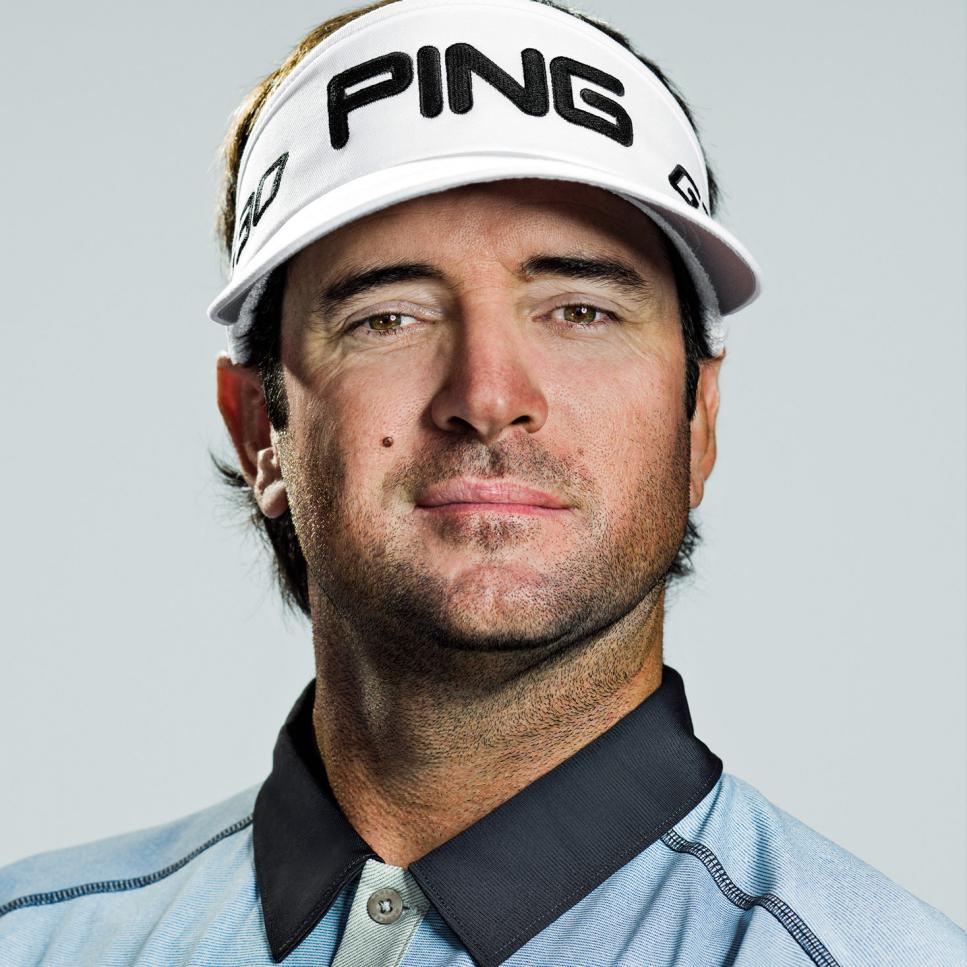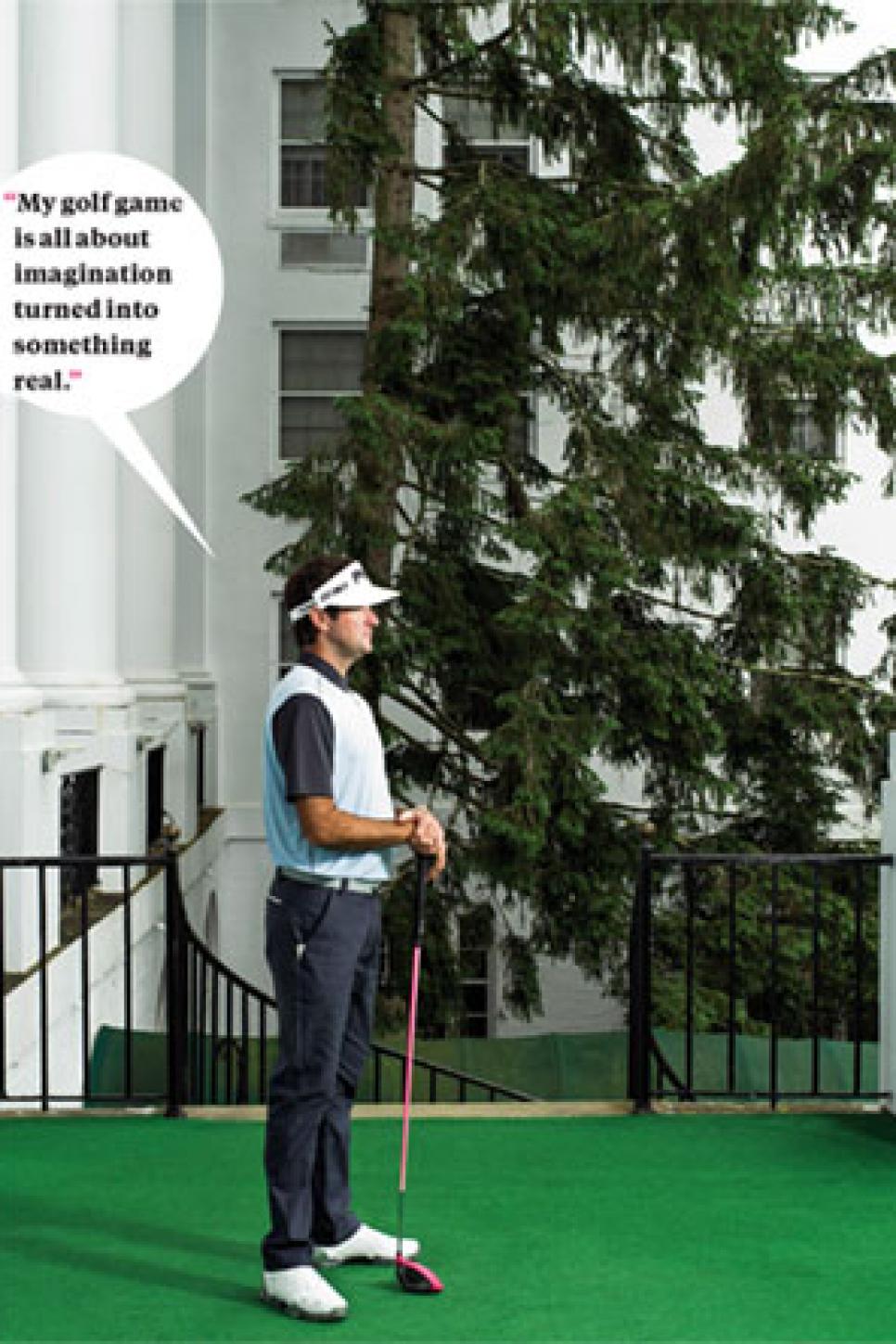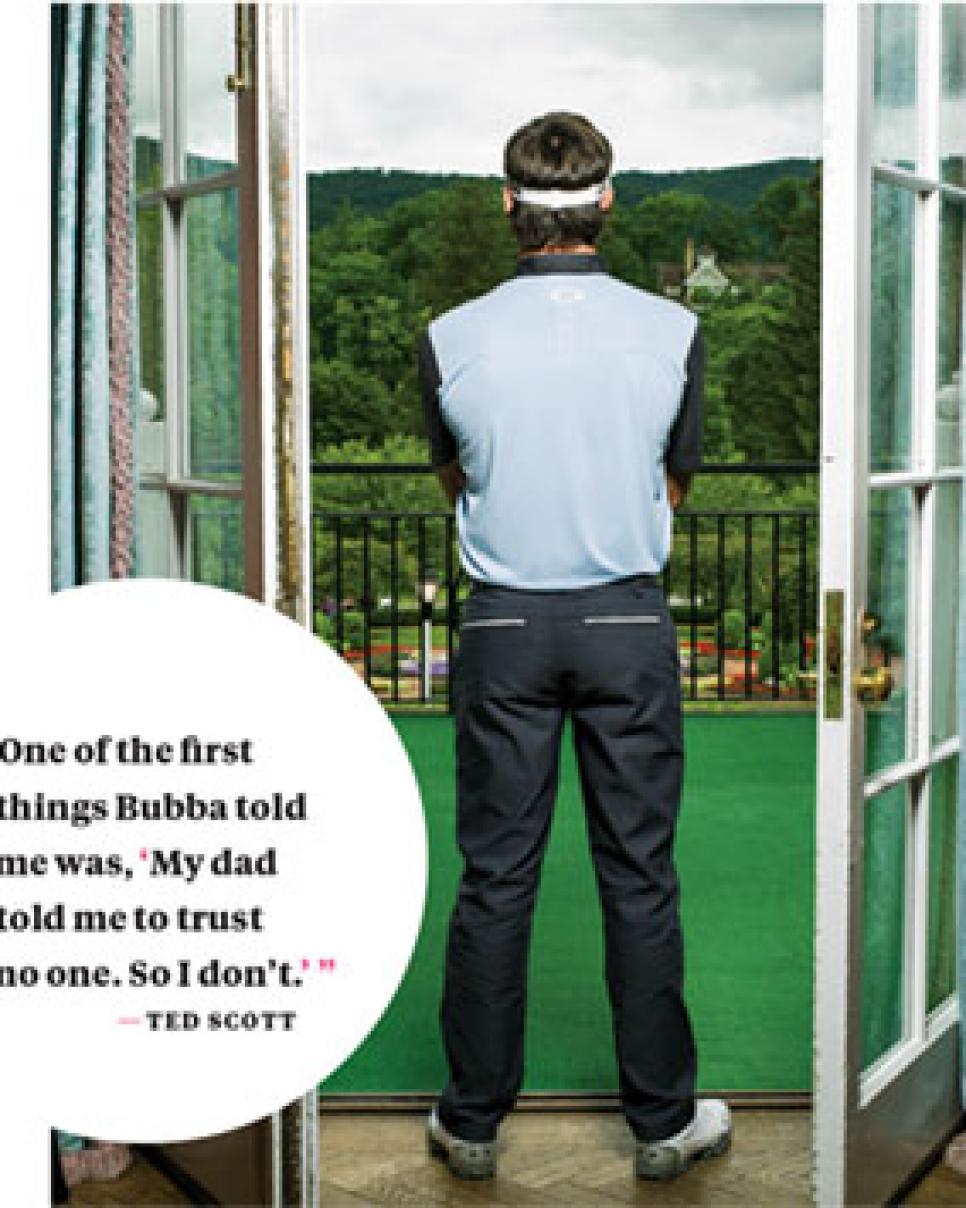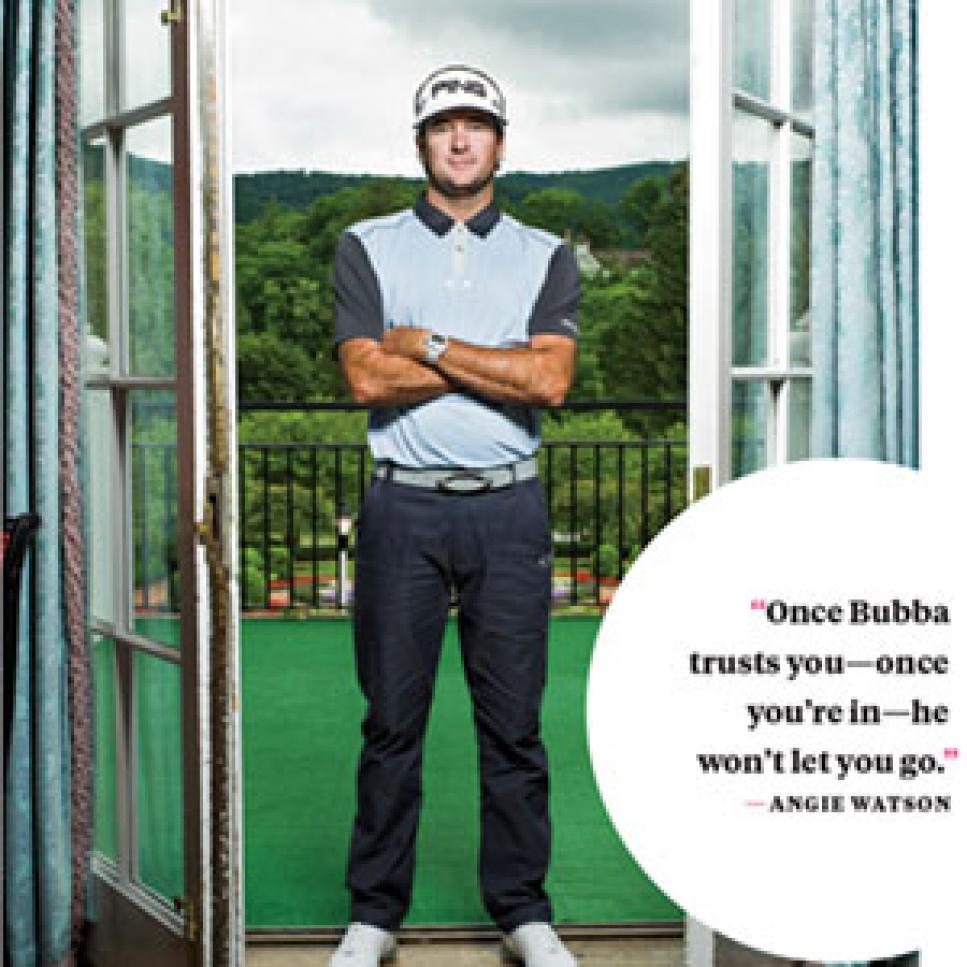Being Bubba

Bringing down a drone was Bubba Watson's idea.
On the vast grounds of The Greenbrier, where he has a home with his family, there were several possibilities our video team suggested to capture Bubba at his leisure, including riding a horse, skeet shooting, bowling, shooting a basketball (his wife, Angie, is a former player in the WNBA) or even throwing a football at the New Orleans Saints' on-site practice facility. But Watson was excited by another option: whistling full shots at a distant (and unarmed) drone, with intent to destroy.
"Dude, what would people rather see, me shooting baskets or obliterating a flying saucer out of the sky?" he asked, knowing his long list of YouTube hits (remember the hovercraft?) gave him tacit authority. "C'mon."
The idea blended golf virtuosity with a Letterman-esque wackiness, including a subtle nod to the military and the memory of his Green Beret father. Plus, Bubba would have something good to put up for his 1.4 million Twitter followers. All an example of Watson's 36-year-young multitasking synapses.
Armed with his new toy, a 21-degree 7-wood he began using this year, Watson takes to the Old White's 17th fairway and begins shooting tracers at the buzzing device about 50 yards and varying heights away (see video below). As he continues to narrowly miss, he unconsciously puts on a clinic in Bubba Golf, hitting various trajectories and even slices and hooks, all the balls ending in a tight circle just short of the green. Even at rapid-fire frequency, there are no fats, no thins, no sprays. Hitting a golf ball absolutely square with incredible force is easy for Bubba Watson, and in this bucolic West Virginia valley where the supernal Sam Snead played so much golf, the self-taught lefty seems a natural successor.
With the drone still airborne after a couple dozen shots, Watson gets more immersed in the challenge, showing none of the exasperation he might during a tournament. He's in a sweet spot, checking all his comfort-zone boxes: a scheduled event he could prepare for; home ground that reminds him of his mother's family farm near Tupelo, Miss.; two members of his management team and Greenbrier pros making up a familiar group; and a novel, stimulating activity.
Finally, Watson wings one of the propellers, which rather than blowing up the drone, sends it crazily upward and then into a long dive onto the lush fairway, bouncing instead of breaking. "Man, that was bad," Watson jokes to Burt Baine, The Greenbrier's golf club general manager. "You guys still want me as an endorser?" Then aware that onlookers are awaiting his next move, he plays the part by announcing the Bubba Double Wink, closing both eyes and quickly opening them in unison, then deadpanning his practiced exit line, "You're welcome."
Alas, Watson is not always this loose. In competition, he's often high-strung and irritable. Slow play drives him crazy, as do wet conditions, bad bounces and miscalculated distances.
Foreign venues, too, which is why at No. 3 in the world, Watson was not even among the top-10 favorites going into the Open Championship at St. Andrews, where his length and shotmaking should be ideal. His 2011 description of the Arc de Triomphe in Paris--"an arch; whatever; I rode around in a circle"--could have come from a Jeff Foxworthy riff on rednecks.
Insiders are amused by other Bubbaisms that possess the kind of exasperation-skewed logic that has made former NFL coach Dennis Green's "They are who we thought they were!" stick in the mind. With Bubba it's "There's no reason for me to show up" (Hartford, 2011); "Water on the clubface, bro" (PGA Championship, 2014); and the original, referring to tour players: "Veterans can kiss my ass" (New Orleans, 2008). All are on call to leaven temper tantrums with humor.
A standard Watson line is a variation of "I have issues." Though never diagnosed, he is sure he suffers from ADHD (attention deficit hyperactivity disorder). An expert in the condition, and a huge Watson fan, Dr. Edward Hallowell, longs for Bubba to let him help, likening Watson's high creativity and low emotional control to a "Ferrari brain with bicycle brakes."
True, Watson has twice kept it together at the Masters, but his careening at major courses where his all-around skills would seem to give him an advantage vexes those who admire his talent. Most notably at Pinehurst last year, he talked himself out of the U.S. Open, calling the area outside of the fairways "weeds." At Chambers Bay, Watson rationalized his missed cut by exaggerating the challenge: "Two guys can hit from the fairway, and the ball marks can be a foot apart. One guy is 60 yards off the green, and one guy is 20 feet from the hole."
And sometimes his behavior seems irrational, as when he refused to take part in a casual long-drive contest before the PGA last year in part because he hadn't been informed, hitting a 3-iron before stomping off. "I don't like change," Watson offered in partial explanation. "I'm terrible on change."
And, apparently, on locker-room protocol. In a recent ESPN poll of 103 tour players, Watson received the most votes (23, to second-place Patrick Reed's 11) to a question that asked "------ is in a fight in the parking lot. You're not helping him."
Davis Love III, assistant captain of the 2015 U.S. Presidents Cup team and captain of the 2016 Ryder Cup team, will have Watson in his locker room. "There are some norms out here that Bubba doesn't do that well," Love says. "He doesn't always say 'Hi.' And he doesn't remember names. To some guys, that stuff matters a lot."
Says Ben Crane, a Watson confidant and fellow member of the tour's Bible-study group: "Bubba's not intentionally out to blow people off, but very often he's not thinking of other people; he's thinking of himself. Like we all get in golf."
Watson grew up in the Florida Panhandle an unabashed individualist. His late father, Gerry, who died of throat cancer in 2010, told his son he could be a follower or a leader--and not to be a follower.
As a youth, Bubba was a pitcher/first baseman who idolized the Yankees' Don Mattingly but resented relying on others. "Team sports for me is tough," he says. "It hurt me when I played best and lost because of teammates behind me."
The person best positioned to observe and comment on Watson the player and the person is his longtime caddie, Ted Scott. Although some Watson rants picked up by microphones have caused the Twitter hashtag #prayfortedscott to go viral, the two are extremely close friends.
"When we started together in 2006, Bubba had already rubbed a lot of people the wrong way," Scott says. "I had friends who called me and said, 'Man, that guy you're going to work for is a jerk.' And my impression the first week was, I don't know about this guy.

"What I quickly found out was that Bubba was very uncomfortable in social situations," Scott says. "It's difficult for him to make eye contact with people he doesn't know. He told me he has a fear of crowds. And when we're fearful, we do things we shouldn't do. All the ignoring of people, the abrasiveness, the overreacting, the aggressive joking, were all defense mechanisms from being afraid of letting people know who you are."
Scott's understanding of his player deepened after he got to know Gerry Watson. The elder Watson served in Vietnam and in other locations, but, as his son told David Feherty in 2012, "He was real quiet about it. A bunch of medals in a box--wouldn't let me see them. Said he lost a lot of good friends. A lot of things happened over there. He was just living with the dreams and the fears at all times."
"Bubba's dad was tough," Scott says. "The first two times I was around his dad, it was for two hours, but I wasn't introduced to him, we didn't shake hands, didn't exchange names. The second time I saw him, I went to shake his hand, and he said, 'I don't shake hands.' I thought he was the coldest person I'd ever met in my entire life. Not even a contest.
"The next time, I figure, I'll just ignore him. But I guess he had assessed me and thought I was all right, and he started talking to me, and from that day on he was one of the best people I ever met in my life. When he died, he had four phone numbers in his phone, and mine was one of them."
Adds Scott: "Children learn from watching. Bubba was close to his father. One of the first things Bubba told me was, 'My dad told me to trust no one. So I don't.' He saw the world through his dad's eyes because that was his best friend."
Crane says, "Bubba's dad didn't want to take out his military experience on Bubba, so he kept it inside. That was a blessing in some ways, but in other ways very hard on a kid. Openly-expressed love was not something that was modeled for Bubba by his dad. He's still learning to express positive emotion."
Scott has encouraged Watson to be more attuned to exchanging salutations with fellow players and acknowledging fans. "I tell him, 'People want to like you. You're a freak athlete--they want to be part of your life. Show them who you are.' Bubba actually loves people. He does all those videos because he loves people. They're also a refuge because they offer him a controlled environment. Which is all based on fear. But Bubba is going in the right direction. And to do it in the spotlight--when all you get is praise and ego gratification--is even more impressive."
The attention on Watson has gradually grown since his first PGA Tour victory, at Hartford in 2010. He has eight victories, including the two green jackets, as well as mega endorsements and social-media stardom. All are potential ingredients of jealousy, which might have tilted that ESPN poll.

There's also the way Bubba plays. Says Geoff Ogilvy, an occasional practice partner: "He plays golf completely different from everybody else. And a lot of guys on our tour probably get annoyed when somebody is better than them doing it in a way they don't agree with. The great majority of tour pros love the preparation side: the practice, the technique, the gym. It's the road that got most of them out here. But Bubba hates that aspect of it. He loves to play. He is truly, in the purest sense, a golfer. He never thinks about technique, and I'd guess he plays more rounds of golf than anyone on tour by a long way. During a tournament, instead of hitting balls, he'll go play nine holes at a local course with Teddy. And sometimes he'll play with just three clubs, or hit all draws, or all fades. That's his practice, hitting golf shots on a golf course."
Lee Trevino, who recently was named pro emeritus at The Greenbrier, calls Watson the most physically talented player in the game. "The key to playing the tour is hitting shots from the subconscious mind. If you don't believe you can do it without having to think about how you're doing it, you might manage to hit a good shot about 50 percent of the time, but never under pressure. Bubba completely trusts his ability to hit the ball--all he's thinking about is what he wants the ball to do, and with his ability, it gives him a huge arsenal. If he ever figures out how to hit straight instead of curving everything, look out. Every time he wins a tournament, he learns and just keeps getting better."
Ogilvy most admires the joy Watson can take in a friendly round: "On tour he gets nervous and can be an emotional roller coaster, which is the area where he can most improve. But I've played with him a couple of times away from the tour, and he truly is like a kid having the best day of his life playing golf. His whole demeanor is like a younger boy. He just plays golf in a really endearing way."
Watson's cadre of close friends--which among the players includes Crane, Rickie Fowler, Aaron Baddeley and Webb Simpson--sees him in much the same way. A group of them stayed to follow Watson in his 2012 playoff at Augusta against Louis Oosthuizen. "You don't see players do that very often for another player," Love says.
"It's easy for me to get along with Bubba," Fowler says. "He's got a huge heart, and we both have a lot of kid in us, although he probably has more. Even though I'm 10 years younger [at 26], I'm the big brother."
"Bubba is often initially misunderstood because at first he holds back," says Angie Watson. "But once Bubba trusts you--once you're in--he won't let you go. He's an amazing friend."
In the course of adopting two children (Caleb, 3, and Dakota, 9 months), Watson has become more conscious of his effect on others. "Caleb mimics everything he does," Angie says. "Even something as small as putting his hands on his hips and kind of looking at the ground annoyed because a bunker shot didn't quite react the way he wanted it to. Bubba holds that very high in the back of his mind. Bubba has set the bar high for himself. He wants to walk away from golf being considered a great guy and a great role model. That matters more to him than being considered one of the greatest golfers."
The Watsons, who were baptized together shortly after they were married in 2004, are committed to using the Bible as their instruction manual for the challenges of life. Which hasn't been easy for Bubba. "The Bible is very jumbled for him, like it is for a lot of people," Angie says. "He's had enough after 15 minutes, but he's no longer afraid to ask those who can study it for hours, 'Hey, I'm really struggling with how much my world has changed since I won the Masters. What does the Bible say about this--can you shed some light?' And those people have been instrumental." As a result, Watson at times actually invites criticism. After the ESPN poll was released he said, "I'm glad it came out, and it's going to help me improve." He even said he voted for himself: "If I'm doing something wrong, I want someone to call me out. I want my wife to. I want my friends to. I want the public to. You've got to look at it and go, Maybe I need to listen."
As a result, Watson, who had been publicly against same-sex marriage and saw no problem with the image of the Confederate flag on the roof of the General Lee (the "Dukes of Hazzard" car he purchased in an auction), says he now accepts the Supreme Court decision and is redoing the car's roof, tweeting, "All men ARE created equal, I believe that so I will be painting the American flag over the roof of the General Lee #USA."
Watson, often accused of arrogance, is humble in a video on his website with good friend Judah Smith, a pastor at The City Church in Seattle, during a friendly round of golf. At one point, Watson says, "Let's just take me, because I was always messing up, I always have sinful ways, whatever you want to call it. What would you say to a guy like myself who thinks he's not good enough, thinks he's always doing wrong, and that the Bible's overwhelming? I mean, where do you start?"
With his foundation, and his charities, Watson is well-established in philanthropy. He has ambitions beyond the scope of most golfers. "I can go through life the way I've been going, and everybody will still love me the same, but I would know deep down that I didn't do more," he says in the clipped cadence accompanied by steady eye contact that indicates he's fully focused. "I feel like as an athlete/celebrity, whatever I call myself, I need to do more.

"I just have dreams," he says, mentioning plans for a radio station, a burrito shop, deeper involvement in charities in the Pensacola area, even buying the public golf course where he grew up. "Now that I have the income so I can do some of them, my dreams are actually coming to reality.
Why would you not do the things you can do? It's just using your imagination. Look at my golf game. My golf game is all about imagination turned into something real."
To become great, Watson will have to envision for himself something beyond his current goal of 10 career victories.
"That's another defense mechanism, maybe, to lower expectations," Scott says. "Bubba underestimates himself.
He probably isn't going to get better physically, but that's because he's always had some kind of strange hand/eye coordination that most people don't have and is basically freakish. When he does something amazing, I always say, 'Hey, great shot, jerk,' because it makes the other players feel inferior. But he can improve a lot in the mental aspect, get better at controlling his emotions and using better strategy and being tough and being able to swing freely under pressure. He's become a better putter by just getting it to the hole. He left everything short forever. That was fear-based. But Bubba is losing his fear."
Watson won't go that far, but allows, "I think I'm getting smarter. That's why mid-30s is when players have their biggest success, because you've made enough dumb bogeys and enough mistakes that you've made it a little bit cleaner, a little bit better, not always trying to be the hero. So my career is on the up. Yeah, I've rubbed some people the wrong way, probably always will. But I think I'm finally getting better at change."

